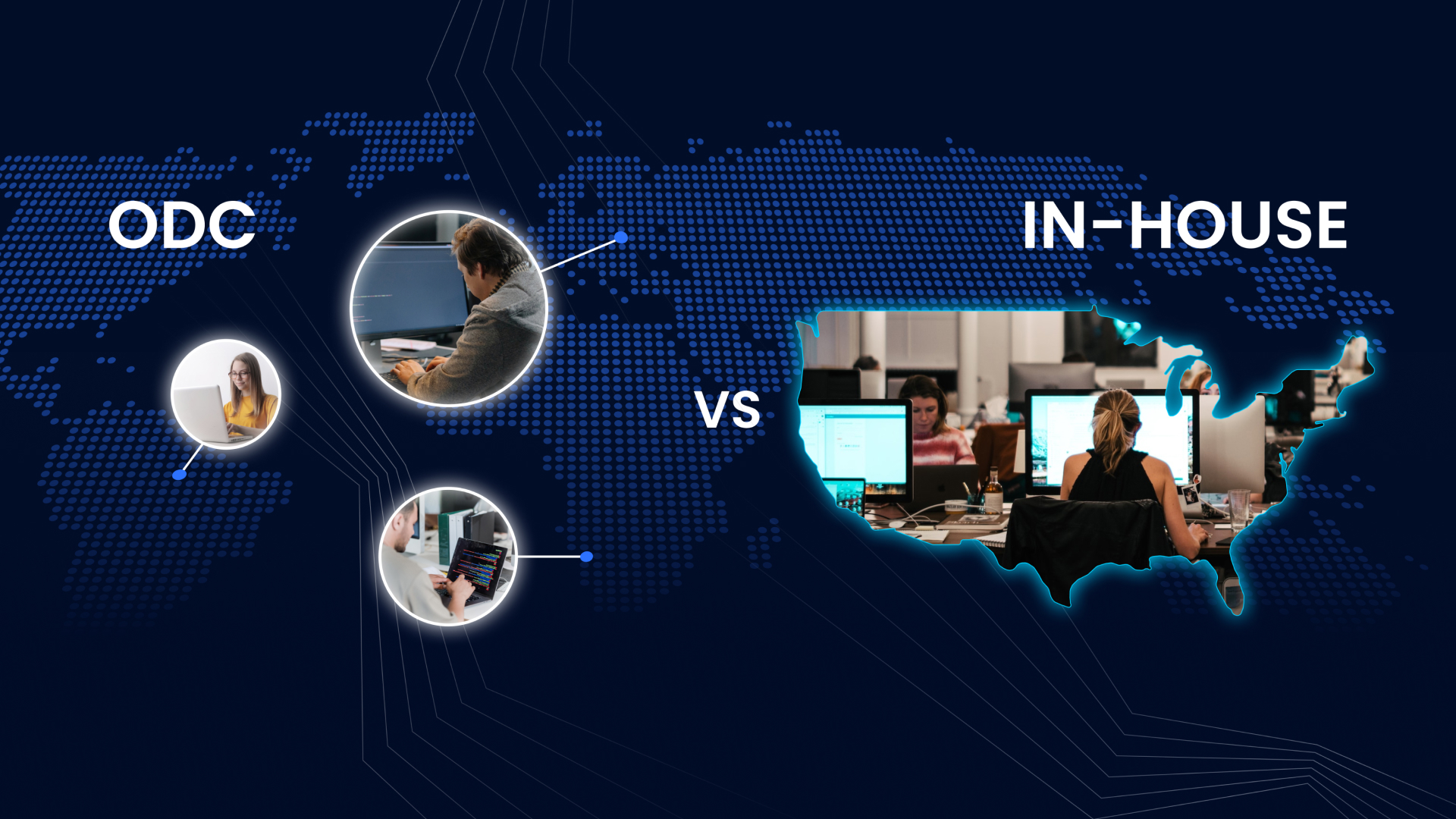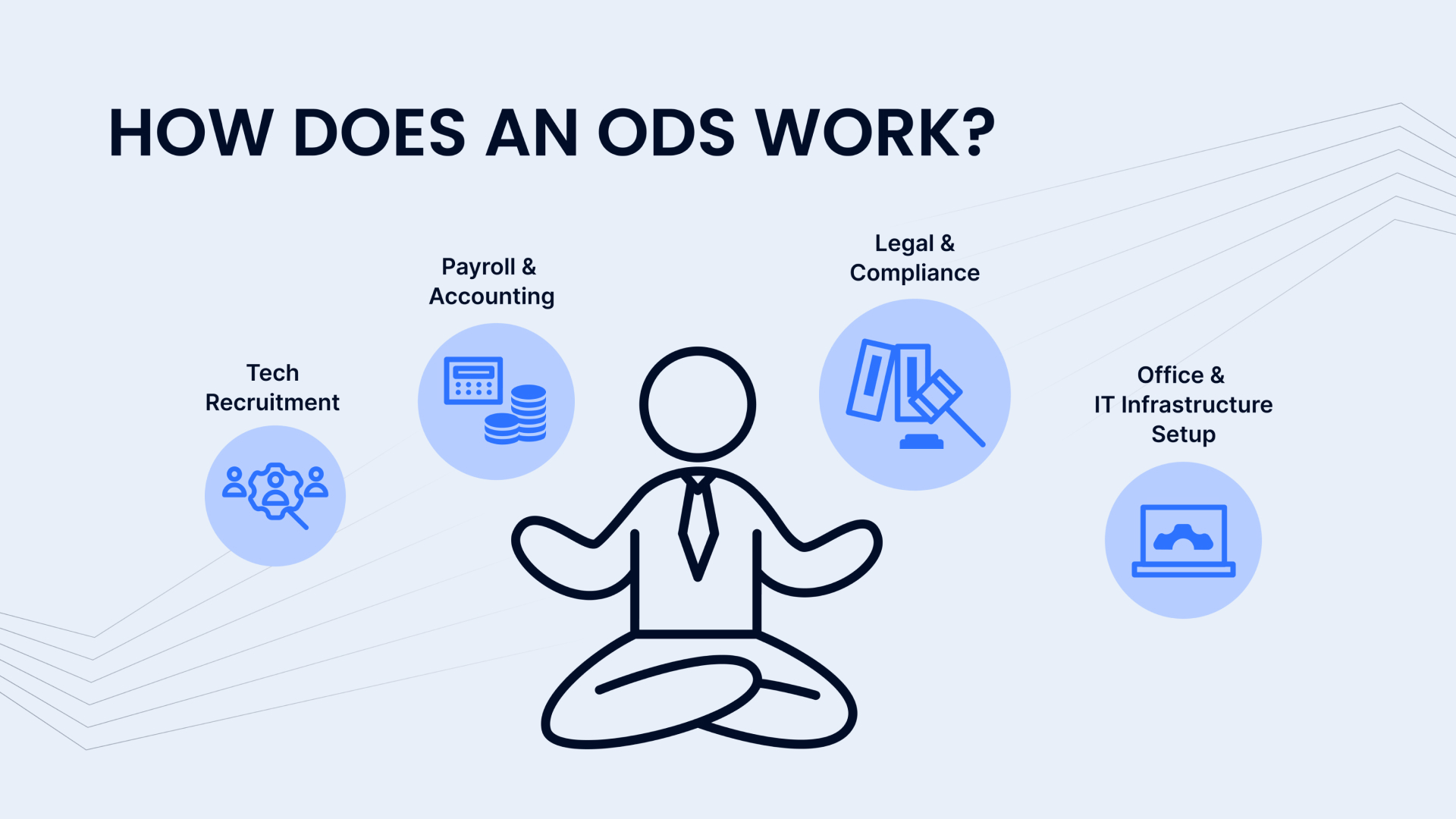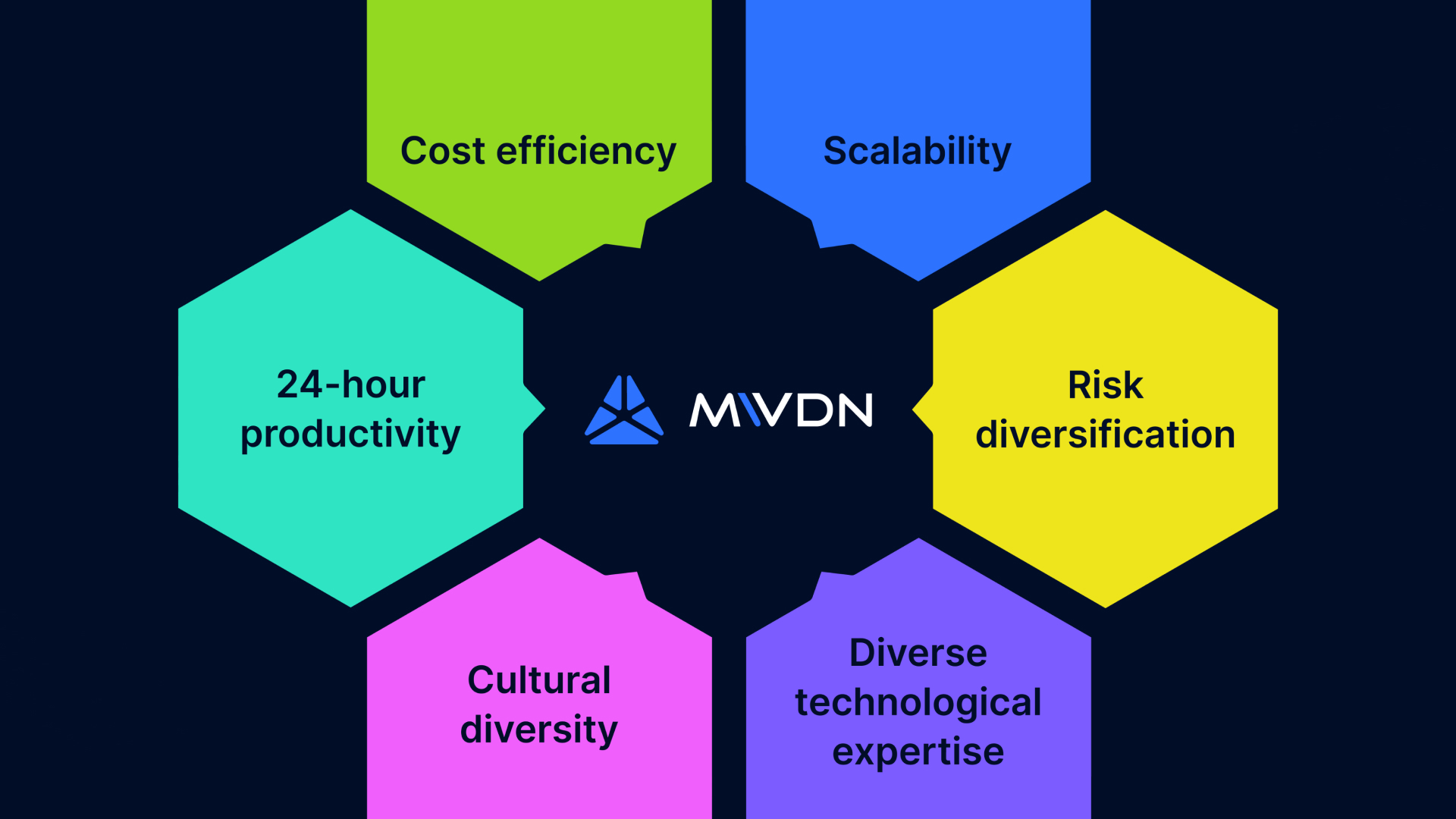
Why would you ever avoid an in-house team working in a fantastic office near the ocean? The reason is quite trivial – the limited budget. That’s the main obvious advantage of any offshore development center (ODC) over other types of team management – it helps you cut costs. The main doesn’t mean that it’s the only one, though! Let’s look deep down into all the pros and cons of ODC and in-house teams so you can make a well-informed choice between the two.
Content:
- What is an offshore development center?
- Five benefits of the offshore development center
- Disadvantages of remote ODC centers
- What is an in-house software development
- Pros of in-house development
- Cons of in-house development
- Summing up
What is an offshore development center?
Imagine a treasure island, but instead of gold and jewels, it’s filled with skilled tech professionals ready to work on your projects. This island is not in your backyard but in another part of the world. Welcome to the world of offshore development centers!
In the digital age, the offshore development center is like a secret fortress of technology located in a distant land (often a country with a favorable cost structure). It’s a dedicated space equipped with all the tech and human resources needed to undertake software development tasks but under the flag of your company.
ODC remote center concept explained in magic terms
Think of the ODC concept as hiring a team of skilled wizards, each specializing in different spells, or in this case, programming languages, development tools, and methodologies. These wizards are not in your local castle but are connected through magical portals, a.k .a. the internet and other communication tools.
Here’s the fun part: You’re the master of this offshore fortress, directing these wizards to conjure up digital solutions, build software castles, or navigate the treacherous seas of complex coding challenges. Yet, you don’t have to worry about the mundane aspects of their lives, like office infrastructure, HR, payroll, etc., because the ODC takes care of it.
This model is like having an extension of your kingdom in a faraway land, where dedicated subjects work tirelessly for your cause, bringing a blend of cost-effectiveness, skill, and efficiency to your empire’s digital endeavors.
While offshore development center services may vary depending on your service provider, the main ones are the following:
- Recruitment according to your requirements, which includes screening, background checks, and tech interviews if you need them to be held on your contractor’s side.
- HR and administrative support, which includes hiring and firing procedures, time tracking (sick leaves, vacations, holidays), and motivational/team-building activities.
- Accounting, taxation, and labor law compliance.
- Software, hardware, and other paraphernalia on demand.
- Working space and all the office supplies on demand.

Five benefits of the offshore development center
The main reason why so many enterprise-level businesses and startups opt for ODC is its (1) cost efficiency. Offshore centers offer access to skilled professionals at a lower cost due to the economic differences between countries. This allows for budget savings due to lower direct labor costs. But that’s only one of the ways in which you can spare a couple of grands. With the ODC, you don’t have to maintain an additional administration staff (accountants, HR managers, office managers) or pay office rent.
Another important advantage of ODC is (2) scalability. As you don’t bear the risks of overhiring or too severe labor contracts with your developers, you can adapt to your business needs much quicker and scale your team up or down based on your project requirements without the long-term commitments or overheads associated with local hiring.
Having some of our colleagues in Ukraine and some of our clients in Israel, we have to face it – today, you need (3) risk diversification. Having operations in different geographical locations spreads out your operational risks. If one area faces challenges, your business can continue functioning through the others.
Many of our customers mention the (4) over-the-clock productivity cycle as one of our offshore development center benefits. Choose an ODC in a different time zone, and your business operations will continue around the clock. When your local team finishes their day, the offshore team can take over, doubling your productivity hours.
Diversity leads to innovation. With offshore teammates, you will have (5) cultural diversity and diverse technological expertise. Working with a team from a different cultural background brings diverse perspectives, which can lead to innovative solutions and ideas that might not emerge in a more homogenous environment. Exposure to global practices and problem-solving approaches can drive innovation, combining diverse insights and ideas to create unique solutions and products.

Disadvantages of remote ODC centers
When we mention the cons of the ODC approach, we usually list all the disadvantages of remote work, like quality control concerns or management and oversight difficulties. However, you can easily rise to the occasion using the tools the Covid pandemic has provided us.
There are also disadvantages that are specific only to outstaffing, with the ODC approach being one of its varieties.
- Data security risks. Remote ODC can pose higher risks in terms of data security, especially if sensitive information is being handled. Ensuring compliance with data protection regulations across different countries can be complex.
- Dependency on external teams. Relying on an offshore team can create a dependency, which can be problematic if there are disruptions in the offshore location due to political instability, economic fluctuations, or natural disasters.
- Integration issues. Integrating the offshore team with the local team and ensuring that both work seamlessly towards common goals can be challenging. It requires significant effort to align processes, tools, and methodologies.
- Potential impact on employee morale. In some cases, the local team doesn’t entirely get what an offshore development center is and starts perceiving it as a threat to their job security, which can impact morale and productivity.
What is in-house software development?

With more information about ODC, let’s compare it to the traditional way of getting things done – hiring people locally and placing them in your office. So, what is in-house software development? It creates and maintains software applications using your internal resources and staff rather than outsourcing the work to external vendors. This approach involves a dedicated team within your company responsible for the full software development lifecycle, including analysis, design, coding, testing, deployment, and maintenance.
Pros of in-house development
Whenever you have unlimited resources and significant reasons to do so (for example, maintaining control over the development process and intellectual property is a high priority for your business), hire an in-house software development team. These are some of the advantages you will enjoy:
- Control and oversight. You will have complete control over the development process, including the project timeline, technology choices, and the overall direction of the software project.
- Devoted team. Team members who are directly hired and managed by the company are often more aligned with the company’s culture and long-term goals.
- Direct communication. Direct and immediate communication among team members can lead to more efficient problem-solving and constant synchronization.
- Intellectual property ownership. You retain full ownership of the intellectual property created by your in-house team.
- Data security and privacy. In-house development can offer enhanced data security, as the entire development process is contained within the company, reducing the risk of data breaches or leaks to external parties.
- Long-term skill development. With an in-house team, you can build and retain technical expertise and knowledge internally, which is one of the most valuable in-house software development advantages for future projects and ongoing maintenance.
Cons of in-house development
In-house software development may not be the most cost-effective or efficient approach for every organization or project. As we’ve mentioned the pros, let’s see the cons of in-house software development.
Money. You will pay a lot. You will need significant upfront costs for hiring staff, investing in technology infrastructure, and ongoing training and development. Moreover, maintaining an in-house team requires continued investment in time and money. You will be responsible for all team operation aspects, including recruitment, training, and management.
What’s more, you will need to allocate sufficient resources, including staff time and budget, to the development project, which can be challenging, especially if you’re a small organization or a startup without existing technical expertise.
Stagnation. In-house teams can become isolated from broader industry trends and best practices, potentially leading to a stagnation in skills and knowledge. Project tunnel vision is another challenge you might face. Being deeply embedded within the organization, in-house teams might develop a narrow focus, missing out on innovative approaches or alternative solutions that an external perspective might provide.
Summing up
Whenever you need custom software development, you can opt for an in-house team or contact an outstaffing vendor to help you assemble an ODC consisting of a tech team devoted exclusively to your project.
Having an in-house team is great! However, there are two major obstacles that might push you into the warm, cozy hugs of ODC. First, in-house hiring costs lots of money. Second, filling in a talent gap with some specific or unique IT expert is still quite a challenge – you can simply have difficulties finding The One. Fortunately, MWDN can help you with that!
Content
